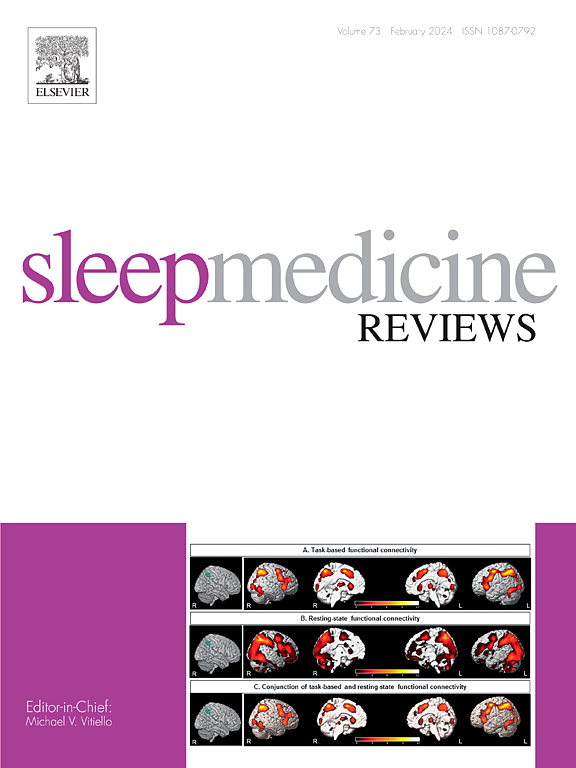Cannabis and sleep architecture: A systematic review and meta-analysis
IF 9.7
1区 医学
Q1 CLINICAL NEUROLOGY
引用次数: 0
Abstract
Cannabis use for sleep is increasingly prevalent, yet its effects on sleep architecture remain unclear. This systematic review and meta-analysis examined polysomnographic evidence on cannabis’ impact on sleep parameters. Eighteen studies were identified, with nine suitable for meta-analysis. Findings indicate that cannabis administration does not consistently alter sleep duration, latency, wake time, efficiency, or sleep staging. While early studies suggested reductions in rapid eye movement sleep, these were primarily based on small-scale trials with high tetrahydrocannabinol doses and significant methodological limitations. More recent studies using larger samples and lower therapeutic doses of tetrahydrocannabinol have reported mixed (and often no) evidence of rapid eye movement (REM) suppression, and the evidence base remains very limited. However, withdrawal from active cannabis use was consistently associated with sleep disturbances, including reduced total sleeping times and prolonged sleep onset latency, as well as REM rebounds. Variability in study outcomes highlights the influence of factors such as dosage, cannabinoid composition, prior cannabis use, and health conditions. Further research using standardised protocols and larger samples is needed to clarify the relationship between cannabis and sleep architecture and to address the discrepancies between subjective sleep improvements and objective sleep metrics.
大麻和睡眠结构:系统回顾和荟萃分析。
大麻用于睡眠越来越普遍,但其对睡眠结构的影响尚不清楚。这项系统综述和荟萃分析检查了大麻对睡眠参数影响的多导睡眠图证据。确定了18项研究,其中9项适合进行荟萃分析。研究结果表明,服用大麻不会持续改变睡眠持续时间、潜伏期、清醒时间、效率或睡眠阶段。虽然早期的研究表明快速眼动睡眠减少,但这些研究主要是基于高剂量四氢大麻酚的小规模试验和显著的方法局限性。最近使用更大样本和较低治疗剂量的四氢大麻酚的研究报告了混合(通常没有)快速眼动(REM)抑制的证据,证据基础仍然非常有限。然而,停止积极使用大麻一直与睡眠障碍有关,包括总睡眠时间减少、睡眠发作潜伏期延长以及快速眼动反弹。研究结果的可变性突出了剂量、大麻素成分、以前使用大麻和健康状况等因素的影响。需要使用标准化协议和更大样本进行进一步研究,以澄清大麻与睡眠结构之间的关系,并解决主观睡眠改善与客观睡眠指标之间的差异。
本文章由计算机程序翻译,如有差异,请以英文原文为准。
求助全文
约1分钟内获得全文
求助全文
来源期刊

Sleep Medicine Reviews
医学-临床神经学
CiteScore
20.10
自引率
3.80%
发文量
107
期刊介绍:
Sleep Medicine Reviews offers global coverage of sleep disorders, exploring their origins, diagnosis, treatment, and implications for related conditions at both individual and public health levels.
Articles comprehensively review clinical information from peer-reviewed journals across various disciplines in sleep medicine, encompassing pulmonology, psychiatry, psychology, physiology, otolaryngology, pediatrics, geriatrics, cardiology, dentistry, nursing, neurology, and general medicine.
The journal features narrative reviews, systematic reviews, and editorials addressing areas of controversy, debate, and future research within the field.
 求助内容:
求助内容: 应助结果提醒方式:
应助结果提醒方式:


